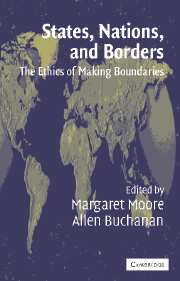Book contents
- Frontmatter
- Contents
- About the Contributors
- Acknowledgments
- 1 Introduction: The Making and Unmaking of Boundaries
- THE JEWISH TRADITION
- THE CONFUCIAN TRADITION
- THE CHRISTIAN TRADITION
- THE NATURAL LAW TRADITION
- THE ISLAMIC TRADITION
- THE LIBERAL TRADITION
- THE INTERNATIONAL LAW TRADITION
- 14 International Law and the Making and Unmaking of Boundaries
- 15 People and Boundaries: An ‘Internationalized Public Law’ Approach
- CONCLUSION
- Index
14 - International Law and the Making and Unmaking of Boundaries
Published online by Cambridge University Press: 24 November 2009
- Frontmatter
- Contents
- About the Contributors
- Acknowledgments
- 1 Introduction: The Making and Unmaking of Boundaries
- THE JEWISH TRADITION
- THE CONFUCIAN TRADITION
- THE CHRISTIAN TRADITION
- THE NATURAL LAW TRADITION
- THE ISLAMIC TRADITION
- THE LIBERAL TRADITION
- THE INTERNATIONAL LAW TRADITION
- 14 International Law and the Making and Unmaking of Boundaries
- 15 People and Boundaries: An ‘Internationalized Public Law’ Approach
- CONCLUSION
- Index
Summary
It is no doubt the case that all of the ethical traditions included in this volume contain within them deep tensions and fissures. Yet the difficulty of isolating the ethical perspectives that are contained within, or that lie behind and around, international law presents a particular challenge. One major – perhaps the major – line of thought has insisted that the international legal order should be separated from both the political order on the one side and the moral order on the other, and that the law as it is should be distinguished from the law as it ought to be. At most, international law is viewed as a vehicle, or a container, or an instrument for the realization of particular ethical goals or commitments that are themselves beyond the scope of legal analysis. So an international legal perspective on ethics and territorial boundaries must begin by addressing, if only briefly, the relationship between ethics and international law.
There is a further important reason for beginning at a general level – namely, that the issue of boundaries and the questions of how, when, and why boundaries may be changed have to be understood within the context of the meta-rules of the legal order as a whole. A state or political grouping may unilaterally assert that a boundary exists, or it may succeed in establishing a boundary unilaterally. Such assertions or actions do not necessarily imply acceptance or agreement by any other party. Equally – and surely a common experience across many different periods, places, and cultures – boundaries may be agreed amongst neighboring states or communities, or groups of states and communities.
- Type
- Chapter
- Information
- States, Nations and BordersThe Ethics of Making Boundaries, pp. 275 - 297Publisher: Cambridge University PressPrint publication year: 2003
- 9
- Cited by



